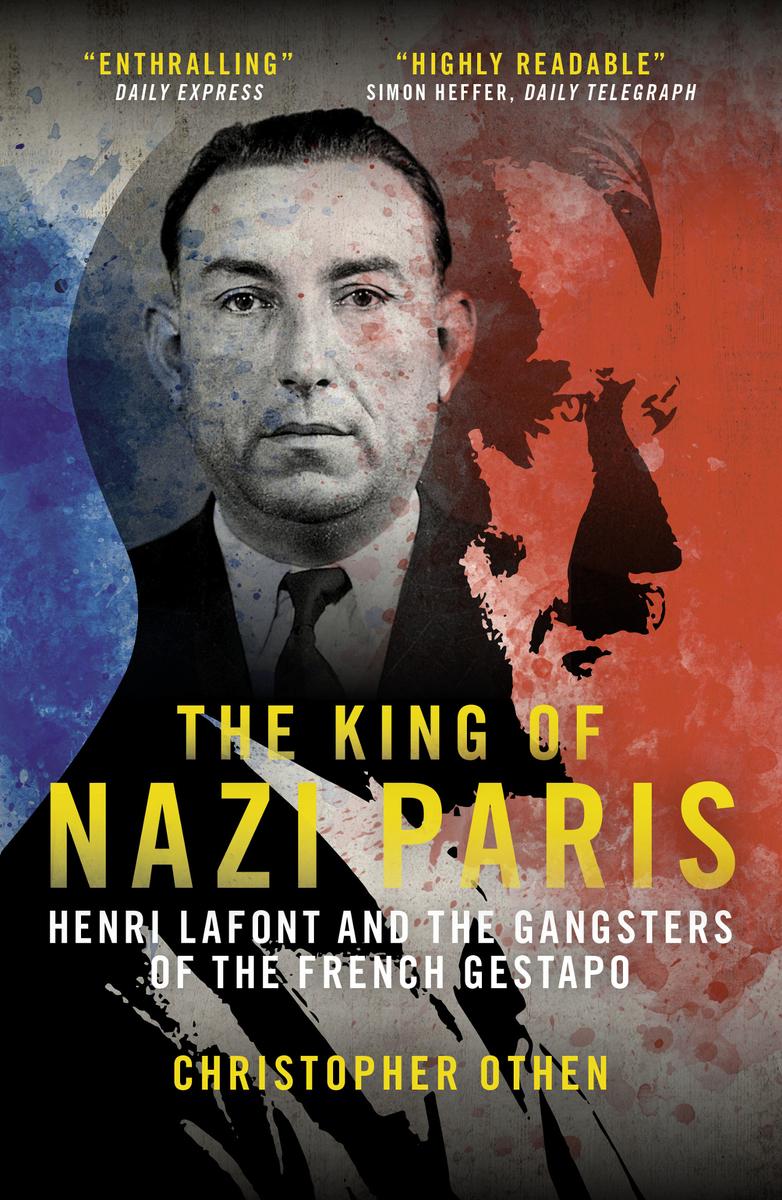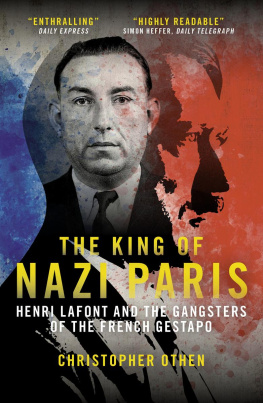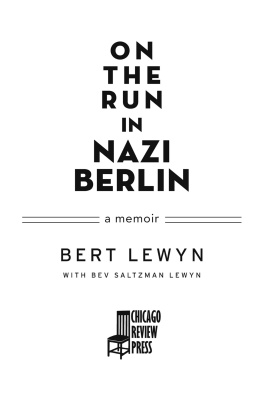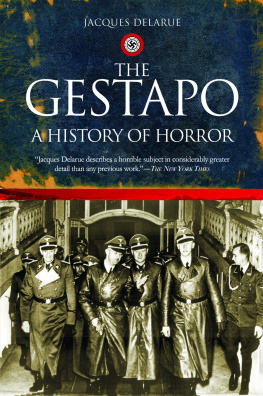Othen.Christopher - The King of Nazi Paris: Henri Lafont and the French Gestapo
Here you can read online Othen.Christopher - The King of Nazi Paris: Henri Lafont and the French Gestapo full text of the book (entire story) in english for free. Download pdf and epub, get meaning, cover and reviews about this ebook. year: 2020, publisher: Biteback Publishing, genre: Detective and thriller. Description of the work, (preface) as well as reviews are available. Best literature library LitArk.com created for fans of good reading and offers a wide selection of genres:
Romance novel
Science fiction
Adventure
Detective
Science
History
Home and family
Prose
Art
Politics
Computer
Non-fiction
Religion
Business
Children
Humor
Choose a favorite category and find really read worthwhile books. Enjoy immersion in the world of imagination, feel the emotions of the characters or learn something new for yourself, make an fascinating discovery.
- Book:The King of Nazi Paris: Henri Lafont and the French Gestapo
- Author:
- Publisher:Biteback Publishing
- Genre:
- Year:2020
- Rating:4 / 5
- Favourites:Add to favourites
- Your mark:
- 80
- 1
- 2
- 3
- 4
- 5
The King of Nazi Paris: Henri Lafont and the French Gestapo: summary, description and annotation
We offer to read an annotation, description, summary or preface (depends on what the author of the book "The King of Nazi Paris: Henri Lafont and the French Gestapo" wrote himself). If you haven't found the necessary information about the book — write in the comments, we will try to find it.
The King of Nazi Paris: Henri Lafont and the French Gestapo — read online for free the complete book (whole text) full work
Below is the text of the book, divided by pages. System saving the place of the last page read, allows you to conveniently read the book "The King of Nazi Paris: Henri Lafont and the French Gestapo" online for free, without having to search again every time where you left off. Put a bookmark, and you can go to the page where you finished reading at any time.
Font size:
Interval:
Bookmark:

- vi
THE KING OF NAZI PARIS began when I was living in a fin de sicle apartment in Brussels with high ceilings and a view of the Parc du Cinquantenaire. The place belonged to the Polish government and housed a diplomat who went to mass twice a week and thought a relationship with an English writer might work. She soon discovered otherwise and began emailing me regular bullet-point lists of things that needed to change. The lists evolved over time, but point three usually involved my immediate conversion to Catholicism and point eleven demanded a spontaneous romantic gesture once a week, preferably on Friday evenings.
That summer we took a weeks holiday in Paris to try to save the relationship, even though it felt a lot like grappling with the controls of a crashing aircraft. We went on a Friday evening so I could cross a bullet point off the list and stayed with a friend at the Polish Academy of Sciences somewhere deep in the sixteenth arrondissement. An iron and glass gate creaked open to reveal a four-storey maze of conference rooms and bedrooms and an extensive basement, all curled around a rectangular concrete courtyard. The building had been a hotel before the war and a private residence before that. A plaque on the wall by the worn marble stairs noted that Marcel Proust used to viii visit the family who once lived here. Our room looked out at slick grey Paris rooftops and we were woken every morning at seven by rubber thwacks from the squash club next door. Then we explored the city.
I loved Paris instantly. Its a clich but that doesnt stop it being true. That place tore the heart right out my chest and served it up with garlic and shallots and a glass of red wine. I would have happily paid double and tipped the waiter. History, architecture, restaurants, cafs, the flowing Seine, the chic passers-by and the prime real estate given over to bookshops and art galleries. It was paradise on earth. My diplomat girlfriend had studied here a decade back and wanted to show me the tourist spots: the Eiffel Tower, the Muse dOrsay, Notre-Dame, Montmartre. Before we left Brussels she had asked if there was anything I wanted to see in the French capital. I had a list including Ernest Hemingways apartment, the grave of Charles Baudelaire and a few other things.
I also vaguely remembered having read about wartime gangsters in Paris years earlier during one of those internet sessions when you intend to spend five minutes checking emails and find yourself still there six hours later watching videos of real-life helicopter crashes in Russia. Somewhere between the spam and flying rotor blades was the story of the Bonny-Lafont gang.
This group of crooks, corrupt cops and fallen celebrities had been led by the orchid-loving thief Henri Lafont and his disgraced policeman sidekick Pierre Bonny. They worked for the Nazis and lived like royalty until the Allies arrived. But while the going was good, Lafont reigned as the king of Nazi Paris out of his headquarters at 93 rue Lauriston. Even members of the collaborating French government at Vichy, who supposedly enjoyed the support of Berlin, came to No. 93 and begged for favours. One of Lafonts gang had been the ix former captain of Frances 1930 football World Cup team. Another ran the famous French Connection heroin smuggling ring. A third was Frances first Public Enemy Number One.
The building was still standing. A memorial plaque to their victims hung on the wall outside. I wanted to see it and pay my respects.
Do you think we can find 93 rue Lauriston? I asked.
Its not difficult, my diplomat replied. Were staying at No. 74.
It was the first of a blizzard of coincidences that pushed me into writing the book. A biography of French gangster Jo Attia Id picked up second-hand in Brussels a week before the holiday turned out to involve the gang. Attia had been a prominent member, at least until he had second thoughts. I opened a glossy photobook in a Paris museum gift shop and discovered that a familiar picture of two lesbian drinkers at the Chameleon Club, seen in various contexts many times before, apparently featured Violette Morris, a collaborator and friend of the gang. Infamous wartime serial killer Marcel Petiot had counted a member of the gang among his victims. Id read for some reason two separate biographies of the good doctor but only discovered the Bonny-Lafont connection during this holiday.
The biggest coincidence of all was in a book about wartime Paris, picked up from a four-storey Gilbert Joseph shop in the centre of the city, which noted in passing that during the war 74 rue Lauriston had housed members of the gangs paramilitary unit, the Brigade Nord-Africaine. We were staying in a building, possibly even in one of the rooms, where Lafonts Moroccan mercenaries had slept during the spring of 1944 while the resistance movement strengthened and the Allies waited in the wings of Europe.
The King of Nazi Paris wanted to be written. Id had other ideas for my fifth book but clearly something was pushing me in Lafonts x direction and I had no choice in the matter. I told my girlfriend about it as we sat outside a caf near the Champs-lyses. She nodded and leaned across the bronze tabletop.
I think God wants you to write this book, she said earnestly.
I dont think God wants me to write a book about gangsters who collaborated with the Nazis, I replied. But Im going to anyway.
She laughed at that, something so unprecedented that her lipstick cracked in three places, but our Parisian holiday couldnt save the relationship and I moved to Warsaw a few months later. At first there was lot of staring at the falling snow outside my windows with a glass of whisky in hand, but then I met someone who turned on the lights and my life was better than it had ever been before. Through it all The King of Nazi Paris called out to be written.
There was research, an agent, a contract, more research and then the writing. Sitting in my apartment hacking at the laptop keyboard, the coincidences that had inspired the project remained lodged in my mind even as other kinds of parallels began to emerge.
Polish friends were permanently astonished that I wasnt writing a book about their country, but still managed to remain polite about it. When I explained the subject of my book they would nod and say, Dobrze. So just like Abraham Gancwajch?
I knew the name. Since returning to Poland I had been living in a post-war block of flats on the site of what once had been the outer boundary of the Warsaw Ghetto. In 1940 the invading Nazis walled up 400,000 Jews in 1.3 square miles of city centre as part of their Manichean racial war. SS soldiers starved the Ghetto inhabitants, beat them, and were still surprised when the Jews rose up in early xi 1943 and took on the Germans in an act of suicidal resistance. The battle was only ever going to end one way.
Today there isnt much left of the Ghetto except a few crumbling red brick walls and some tramlines that abruptly terminate in the middle of the street. The Israeli school parties that come here every summer look both moved by the memories and disappointed to find themselves walking around a zone filled with modern hairdressers and supermarkets.
While the Ghetto still stood here, Abraham Gancwajch was its Jewish king. His gang was known as the Trzynastka (Thirteen) after the address of Gancwajchs headquarters in ulica Leszno. Amazingly the building still stands, five minutes from my apartment, although post-war rebuilding has concealed it behind a new number and road name. Unlike Lafont, the Jewish Pole hadnt started out as a gangster but worked instead as a journalist with a strong line in Zionism. All that crumbled when the Nazis invaded Poland and Gancwajch agreed to spy on his own people for the German intelligence services. By December 1940 he had been inserted into the Warsaw Ghetto to undermine the existing Jewish authorities, which were proving too independent-minded for the Germans.
Font size:
Interval:
Bookmark:
Similar books «The King of Nazi Paris: Henri Lafont and the French Gestapo»
Look at similar books to The King of Nazi Paris: Henri Lafont and the French Gestapo. We have selected literature similar in name and meaning in the hope of providing readers with more options to find new, interesting, not yet read works.
Discussion, reviews of the book The King of Nazi Paris: Henri Lafont and the French Gestapo and just readers' own opinions. Leave your comments, write what you think about the work, its meaning or the main characters. Specify what exactly you liked and what you didn't like, and why you think so.





